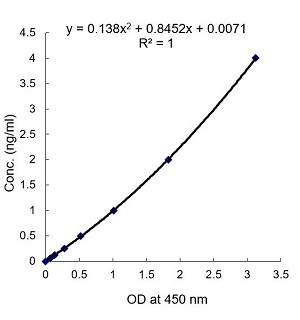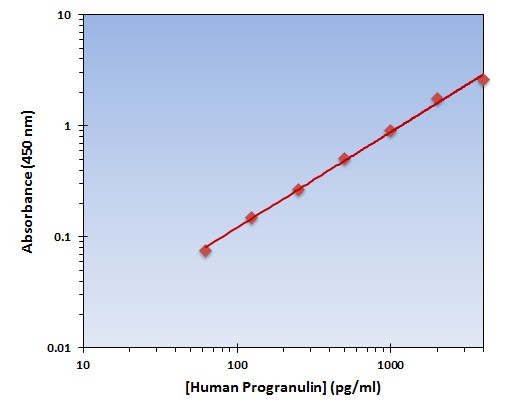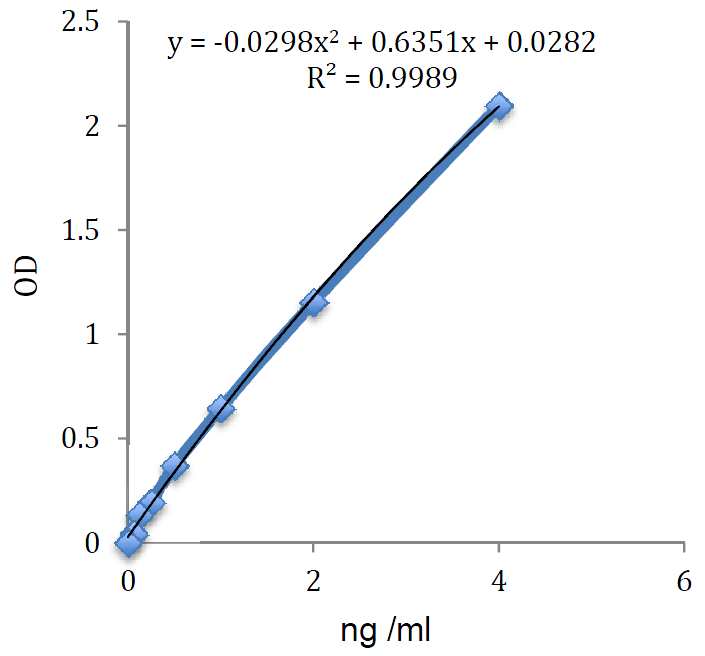
Standard Curve
Progranulin (human) ELISA Kit (mAb/mAb)
AG-45B-0027
ReactivityHuman
Product group Assays
Overview
- SupplierAdipoGen Life Sciences
- Product NameProgranulin (human) ELISA Kit (mAb/mAb)
- Delivery Days Customer10
- ApplicationsELISA
- Assay Detection Range0.063 to 4ng/ml
- Assay Sensitivity60pg/ml
- CertificationResearch Use Only
- Protein IDP28799
- Protein NameProgranulin
- Scientific DescriptionColorimetric Sandwich ELISA Assay. Detects human progranulin in cell culture supernatants, serum and plasma and allows the detection of Progranulin FTLD mutations. Range: 0.063 to 4ng/ml. Sensitivity: 60pg/ml. Samples: Cell Culture Supernatant, Plasma, Serum. Progranulin (PGRN) is a widely expressed pluripotent growth factor that plays a role in processes such as development, wound repair and inflammation by activating signaling cascades that control cell cycle progression and cell motility. In addition, PGRN has also been linked to tumorigenesis. New cutting-edge publications have shown that progranulin might be a biomarker not only for FTLD but also for other types of Alzheimers disease (AD). This new data even suppose the potential of progranulin to be a biomarker for MCI (Mild Cognitive Impairment), which would be a hallmark in AD research. Additionally, PGRN is described as a new ligand of TNF receptors and a potential therapeutic against inflammatory diseases like arthritis. Mutations in PGRN have been found to be a common cause of familial frontotemporal lobar degeneration called FTLD. Since Progranulin has neurotrophic properties and most mutations are predicted to result in a heterozygous loss of gene expression, PGRN deficiency so-called haploinsufficiency is thought to cause neurodegeneration in these patients. GRN mutations are frequent causes of familial frontotemporal degeneration. Reduced progranulin levels in plasma or serum, constitute a reliable, cost-effective biomarker, suitable as a screening tool in patients with familial frontotemporal degeneration. The new mAb-based human Progranulin ELISA Kit has been thor-oughly validated and compared to the standard pAb-based ELISA Kit from AdipoGen (Prod. No. AG-45A-0018Y). With this new ELISA Kit, levels below 50 ng/ml are strongly suggestive of GRN mutations. In a validation on 191 patient samples, confirmed by a molecular gene analysis, the new kit provided a sensitivity and specificity of 100% for de-tecting FTLD mutations. - Progranulin (PGRN) is a widely expressed pluripotent growth factor that plays a role in processes such as development, wound repair and inflammation by activating signaling cascades that control cell cycle progression and cell motility. In addition, PGRN has also been linked to tumorigenesis. New cutting-edge publications have shown that progranulin might be a biomarker not only for FTLD but also for other types of Alzheimers disease (AD). This new data even suppose the potential of progranulin to be a biomarker for MCI (Mild Cognitive Impairment), which would be a hallmark in AD research. Additionally, PGRN is described as a new ligand of TNF receptors and a potential therapeutic against inflammatory diseases like arthritis. Mutations in PGRN have been found to be a common cause of familial frontotemporal lobar degeneration called FTLD. Since Progranulin has neurotrophic properties and most mutations are predicted to result in a heterozygous loss of gene expression, PGRN deficiency so-called haploinsufficiency is thought to cause neurodegeneration in these patients. GRN mutations are frequent causes of familial frontotemporal degeneration. Reduced progranulin levels in plasma or serum, constitute a reliable, cost-effective biomarker, suitable as a screening tool in patients with familial frontotemporal degeneration. The new mAb-based human Progranulin ELISA Kit has been thor-oughly validated and compared to the standard pAb-based ELISA Kit from AdipoGen (Prod. No. AG-45A-0018Y). With this new ELISA Kit, levels below 50 ng/ml are strongly suggestive of GRN mutations. In a validation on 191 patient samples, confirmed by a molecular gene analysis, the new kit provided a sensitivity and specificity of 100% for de-tecting FTLD mutations.
- ReactivityHuman
- Storage Instruction2°C to 8°C
- UNSPSC41116100
- SpeciesHuman






